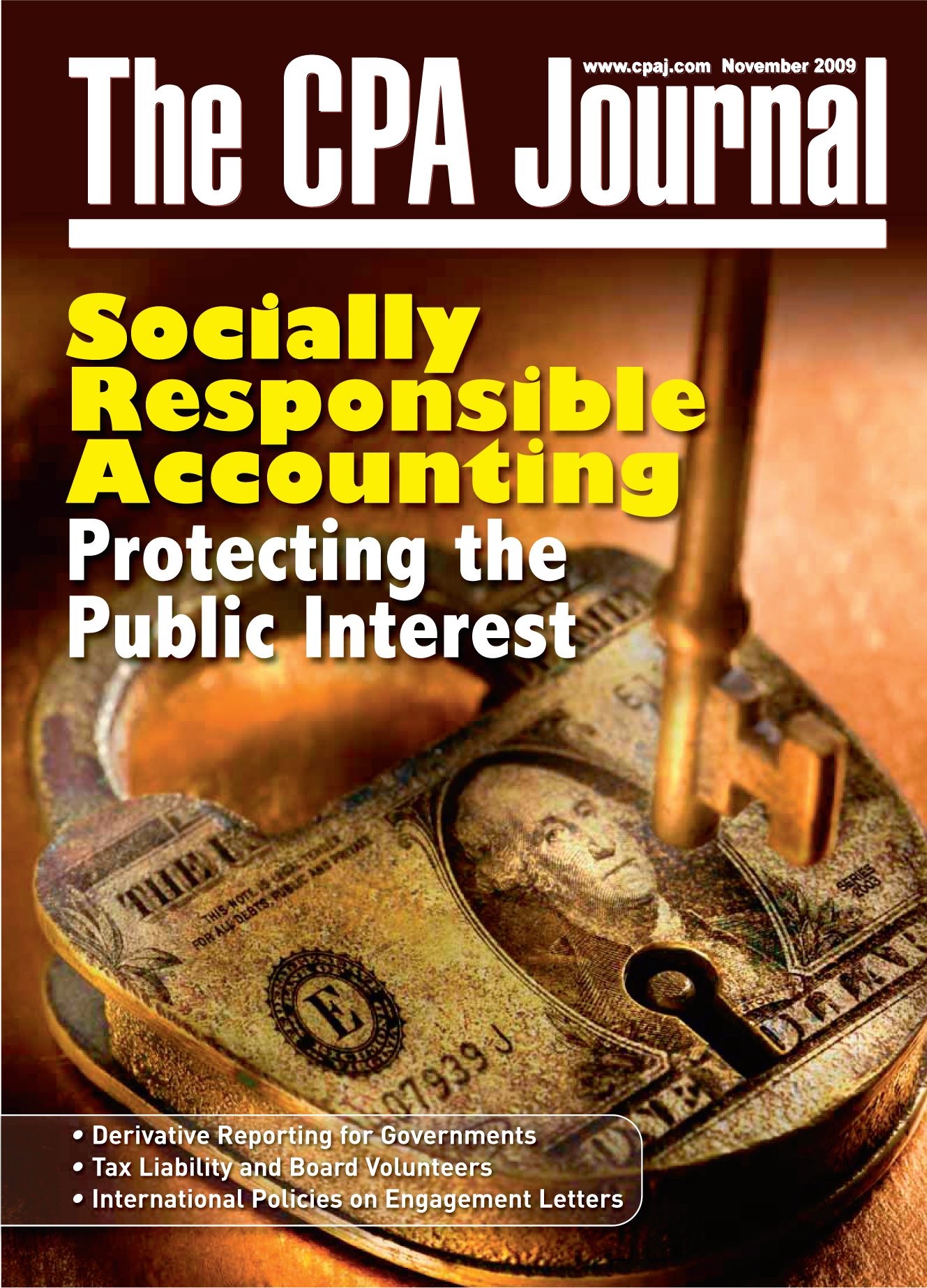The recent multibillion-dollar investment by private equity in a major CPA firm reminded me of the concerns that I raised in an article that I wrote 15 years ago in the November 2009 CPA Journal (years before I joined our editorial team), called “Socially Responsible Accounting: A Call for Reform of the Profession” (https://www.nysscpa.org/0911-rk). If readers will recall, this time was marked by a deep, protracted recession and unprecedented wealth destruction.
The article questioned whether auditors had abandoned their historic obligation to serve the public interest. Had firms capitulated to the interests of their clients? Had they abandoned the ideals of professional independence and integrity? Were auditors complicit in clients’ decision to adopt aggressive accounting positions that obfuscated trillions of dollars of losses and precipitated the Great Recession? Did auditors allow Enron’s use of “mark-to-market” accounting to generate unrealized future gains to be recognized as current income? Did auditors ignore the need to reserve against AIG’s credit derivative bets? Could auditors have insisted on adequate reserves against subprime securitization or off-balance sheet activities from qualifying special purpose entities? This cost investors trillions of dollars between 2007 and 2009; arguably, some investors never recovered.
Former NYSSCPA Executive Director Louis Grumet (“Losing our Moral and Ethical Compass,” The CPA Journal, May 2009) in self-reflection, asked the critical question; “When it comes to assigning blame, when do we stop looking elsewhere and start looking in the mirror?
In the same year, Martin T Stuebs Jr. and C. William Thomas raised similar questions in the Journal about our responsibility to serve the public as opposed to serve the interests of our clients. Stuebs and Thomas argued that our principal obligation extended past Generally Accepted Accounting Principles (GAAP) reporting towards “principled decisions that take into account economic, legal and ethical dimensions of society” (“A Judgment in Financial Accounting: A Principled Approach,” January 2009). It was the same issue that Robert Montgomery, the “father of auditing” in the United States, so clearly raised more than 100 years earlier. The principal responsibility of auditors was to “serve the public” (Auditing Theory and Practice, Robert Montgomery, 1912, p. 11).
The Climate Today
In the spirit of constructive self-reflection, might CPAs take a step back and ask whether the explosive interest from private equity firms, which have invested millions of dollars in CPA firms, today might lead to unintended consequences that might conflict with the profession’s historic obligation to serve the public? Might investments like these from outside interests take over the management focus of the CPA firm and negatively impact their decision making, bending it towards greater profits? Will a non-CPA majority investment in CPA firms impair objectivity and independence? Will legislators and the public ask why CPA firms should continue to be granted a monopoly to audit public companies if they appear to have forsaken their historical obligation to serve the public?
Profits above Purpose
Investors in private equity firms and special purpose acquisition companies (SPAC) clearly see great profit potential and wider opportunities from buying major stakes in CPA firms. Profitability will increase if acquired firms do nothing but reduce investment in their lower profit margin auditing divisions. But what are the consequences to society and the trust that U.S. citizens have in the underlying businesses and the institutions when external auditors are no longer independent of the private equity firms and SPACs that own them?
A Hypothetical Ethical Performance Audit of a PE Firm
If one were to perform an “ethical audit” on a private equity firm that is planning to spend billions of dollars to acquire a majority stake in a global accounting firm, what might be observed? Consider the list of recent violations and their total dollar value [Source: Violation Tracker, Corporate Research Project, 2024] committed by an anonymous private equity firm:
| ▪ Environmental violation | $6,430,719 | 29 |
| ▪ Wage and hour violation | $2,273,859 | 4 |
| ▪ Employment screening violation | $1,500,000 | 1 |
| ▪ Workplace safety or health violation | $988,184 | 18 |
| ▪ Accounting fraud or deficiencies | $750,000 | 1 |
I will leave it to the reader to decide whether this private equity firm would improve the audit quality of an acquired global accounting firm, not to mention whether it would maintain its objectivity and integrity. Is the $750,000 fine for accounting fraud or deficiencies a material item?
Also, if we performed an ethical audit on SPACs, might there be similar ethical issues? Over the past decade, investments in high-risk SPACs have resulted in a wave of restatements and hundreds of billions of dollars of lost stakeholder value; as John Coffee, corporate governance law professor at Columbia Law School, concludes, “these restatements are indicators of fraud” (Gatekeepers, Oxford University Press, 2006, p. 64).
Will Audit Quality Diminish Further?
Over the past few years, for a variety of reasons, audit quality has diminished. According to the PCAOB, “in the 2022 inspections report, audit deficiencies rose in 2022 to highest level on record.” The PCAOB reported that, “in 40% of all audit engagements inspected in 2022 in Part I.A of an inspection report deficiencies were of such significance that, in the PCAOB’s view, the firm [auditors] had not obtained sufficient appropriate audit evidence to support its opinion on the financial statements and/or internal control over financial reporting (ICFR)” (“Spotlight: Staff Update and Preview of 2022 Inspection Observations, Report of the PCAOB,” July 2023, https://tinyurl.com/4968ztzw). In addition, noncompliance with PCAOB standards and rules also rose to the highest level in recent history. Deficiencies not related to the sufficiency of audit evidence “rose in 2022 [to] 46% of the 710 engagements inspected in 2022 … up from 40% in 2021 and 26% in 2020. This increase was largely due to an increase in deficiencies related to critical audit matters.” Similarly, adverse auditor assessments of internal control over financial reporting (ICFR) increased to 5.8%, and the percentage of adverse internal controls doubled, from 9.5% to 18.8%, between 2020 and 2021 (Ideagen, “Audit Analytics SOX 404 Disclosures 19-year review,” 2022, p. 1).
As a result of diminished audit quality, adverse ICFR is now at its highest level since the inception of SOX in 2002 (Ideagen, 2022, pp. 1–3).
The number of adverse ICFR management reports increased to 1,595 in 2021, up from 1,401 in 2020. The number of adverse ICFR management reports represents 23.7% of all management reports filed for fiscal year 2021, up from 21.7% in 2020. This is the highest percentage of adverse management reports filed since the inception of SOX 404. (Ideagen, 2022, p. 5)
Will audit quality be further impaired by management distraction and focus on firm acquisitions by SPACs and private equity firms? Might there be additional consequences to corporate entities buying into CPA partnerships? I have listed just a few here:
- ▪ Might some firms discontinue their audits of public companies? Today, if one of the Big Four firms exited the audit market, the next 25 firms would be unable to take on their audit practice.
- ▪ Might conflicts arise between CPA firm partners who make their living providing professional services based on their professional reputation and private equity firm management, who might seek to maximize short-term profits? The objective of many PE firms is to strip an acquired company of investments that inure to the future, increase the bottom line before selling this higher profit entity to another PE company (Andrew Kenney, “Private Equity Eyes Accounting Firms Large and Small,” Journal of Accountancy, Feb. 1, 2023; https://tinyurl.com/4d2f3y94).
Having worked for two private equity firms during my career, I can say that our objective was to restructure the acquired organization, eliminate investments that would not be realized in the short term, cut marketing and new product development spend, reduce technology investment, optically dress up the company, and then sell it to another PE company.
Might consolidation result in fewer independent audit firms and fewer auditors? Who will protect the investing public if there are fewer independent auditors?
Might consolidation result in fewer independent audit firms and fewer auditors? Might this result in even more adverse audit assessments? Furthermore, who will protect the investing public if there are fewer independent auditors? Who will audit the financials of publicly traded corporations? Even today, “A lack of trained accounting staff was cited as a control issue in 48.7% of adverse auditor assessments and 71.5% of adverse management assessments” (Ideagen, 2022, p. 1).
When private equity investors take a seat at the board, will the following scenarios come to pass:
- ▪ Will audit staff be reduced on what many large firms consider the loss leading division of the firm to improve audit productivity?
- ▪ Will dropping unprofitable clients drive up the cost of audit services? Will raising fees increase the flight of public companies out of the regulatory system? One of the unintended consequences of Dodd-Frank and SOX was the acceleration of public companies out of the regulated financial system. (The term “going dark” was coined by Professor Larry Ribstein.) Today, more money is flowing outside of the regulated financial system as a result.
- ▪ Will there be reduced investment in auditing technology, AI software, and other tools that could enable audit firms to effectively compete against private equity–owned or managed accounting firms?
- ▪ Will private equity owners exert influence on the audit divisions to paint a better picture of a troubled client in which the private equity firm has a significant investment in order to avoid a restatement or lower earnings forecast?
Has Little Changed in 100 Years?
The period following World War I was a period of strong growth for CPA firms. There was roaring stock market and liberal accounting. Fraudulent financial reporting was the precursor to the New York Stock Exchange crash in 1929. Almost 100 years ago, A.P. Richardson, in The Ethics of a Profession, wrote about this issue:
The man or woman who is to occupy a position in a learned profession must know the correct thing to do in all circumstances … however, the profession is threatened with extinction because of the purely financial ambitions of some of its members. … this accountancy is a noble profession and most of those who engage in it are good men. … [however], every unworthy deed is a power for evil … every good deed helps the world. (The Ethics of a Profession, A.P. Richardson, American Institute of Accountants, Century Publishing, 1931)
Protecting the Public Interest
In 1906, Robert Montgomery, the father of American auditing, argued that the principal responsibility of the auditor was to “detect, prevent and uncover fraud” (Auditing, Robert Montgomery, 1906, p. 6). Although this obligation is no longer assumed by today’s auditors, I would argue strongly as I did 15 years ago, that the social responsibility of accountants is to protect the public interest—to ensure trust in our institutions through honest and accurate preparation of audited financials. This is an inviolate obligation of a noble profession. It is in the interest of our profession to retain our integrity and independence regardless of whether auditing firms remain independent or are owned by SPACs or private equity firms.


